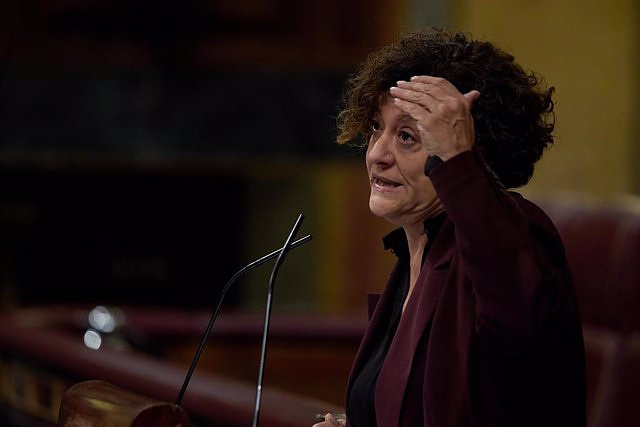It does not rule out that the PP skips the Constitution and exceeds the two-month deadline to process the law in the Senate
MADRID, 27 Ene. (EUROPA PRESS) -
The ERC Justice spokesperson, Pilar Vallugera, considers that everything related to terrorism crimes is already "very well tied up" in the Amnesty Law, after the latest modifications introduced in Congress during the presentation and the commission, but he admits that his group is "concerned" that there may be objections to what has to do with embezzlement.
In an interview with the National Radio program 'Parliament', collected by Europa Press, Vallugera assumes that, although it is possible to negotiate "until the last minute" with the PSOE to refine it even further, the law is already "well on track." "It is not the pressure we had before," he acknowledges, also highlighting that after his parliamentary journey the text is "closer" to the one proposed by ERC at the beginning of the negotiation for the investiture of Pedro Sánchez.
The deputy concedes that the approval of the amendment that is still alive to suppress everything related to terrorism "could be progress", but at the same time she points out that this point is already "very well tied up."
Regarding the possibility that the Court of Justice of the European Union sees a problem in the points in which terrorism crimes are amnesty, he emphasizes that the speakers have been "absolutely respectful" with the content of articles 2 and 3 of the European directive, since it is "mandatory compliance".
"That is where we have sought the robustness of the law, what is excluded is not in contradiction with what the directive says should be punished," he explains, before admitting that what does "worry" them most is that it can be put any problem regarding "embezzlement".
Asked why the drafting of article 2 was not done from the beginning as it is now, the ERC deputy admitted that it was agreed that way because "it was politically agreed" for the investiture of Pedro Sánchez.
"We reached an agreement that was later modified. Therefore, what we have achieved is that we return a little to the beginning, to the agreement that we proposed," he indicated, noting that the text now looks "much more" like the one we proposed. ERC put on the table the one initially proposed by Junts.
The speaker details that in the end it was decided to eliminate the reference to the fact that terrorism crimes for which a final sentence had been imposed would not be amnestied because it was a formula that could not "survive an examination by the Constitutional Court." "It has to do with procedure and has nothing to do with facts, therefore we believed that it weakened the law and that is why a wording was sought that would ignore that element," she explains.
Regarding the criticism of some groups of victims of terrorism who emphasize that "all terrorism violates Human Rights, without exceptions", Vallugera responds that this is the case "as long as" that terrorism exists.
"The issue here is that there has been no terrorism in any case," he asserts, insisting that what happened in the 'procés' cannot be compared in any way to the terror that Spain experienced "unfortunately, for many years."
"The spiral of attempts to prosecute very serious crimes that could not be amnestied by the Spanish courts comes to compare what happened on August 17 (2017) in Barcelona or what happened in March 2004 in Madrid with a demonstration at an airport. What I don't understand is how the associations of victims of terrorism don't come out saying not to trivialize what happened to them because it is very serious," he confessed.
On the other hand, the deputy added, "in Catalonia there were no deaths" except one "from a heart attack" who, in her opinion, "would have had exactly the same condition." "Neither the embassy, nor the emergency services, nor the hospital, nor the State Security Forces and Corps at that time saw any indication that it had any relationship with what was happening," she added.
"That is the absurdity, that we are discussing whether or not we amnesty terrorism because we are amnestying something that did not exist. What there is is the attempt of a court to prosecute for that because they have no other element to prosecute. It is as if Does it occur to you to amnesty, I don't know, crimes against humanity, because there were none, but they still charge you...", he gave as an example.
According to Vallugera, some judges, such as Manuel García-Castellón, have been "giving clues" as to whether in this matter "they were going for the civil or the military": "They have given clues that they would not stop at any adaptation of the type to the done to prosecute the people who were involved in the events of 17 and 19. It has given us the clue that it is not a legal issue, but that it is a political issue," he maintains.
"He has come to tell us, forget about reality and go try to include in this law everything that a judge can imagine and can create in a way that is absolutely out of place and without any basis in reality. That is the drama, that we have left reality, that no one talks about what really happened - a demonstration, some ballot boxes and two people getting into a car - and everything has become a crime of terrorism," he lamented.
On Tuesday, the Plenary Session of Congress will approve the law and send it to the Senate, where Vallugera assumes that it will encounter a "veto" from the PP, which has an absolute majority in the Upper House. The representative predicts that those of Alberto Núñez Feijóo will request reports that are not mandatory, such as from the Venice Commission, to delay their passage through that body as much as possible and that they could even skip the maximum period of two months established by the Constitution for the processing of a norm in the Senate.
"The thing is that in the end a sense of the State is imposed or not. That is to say, we can end up breaking all the seams of the State. Do they want to bypass the Constitution with a non-urgent procedure when the Constitution says that it must be processed urgently? "Do you want to bypass the Constitution with the two months that the Senate has? Let them do it, let them do it, let the constitutionalists do it," he challenged him.

 Exploring Cardano: Inner Workings and Advantages of this Cryptocurrency
Exploring Cardano: Inner Workings and Advantages of this Cryptocurrency Seville.- Economy.- Innova.- STSA inaugurates its new painting and sealing hangar in San Pablo, for 18 million
Seville.- Economy.- Innova.- STSA inaugurates its new painting and sealing hangar in San Pablo, for 18 million Innova.- More than 300 volunteers join the Andalucía Compromiso Digital network in one month to facilitate access to ICT
Innova.- More than 300 volunteers join the Andalucía Compromiso Digital network in one month to facilitate access to ICT Innova.-AMP.- Ayesa acquires 51% of Sadiel, which will create new technological engineering products and expand markets
Innova.-AMP.- Ayesa acquires 51% of Sadiel, which will create new technological engineering products and expand markets The CNMV once again suspends Applus's listing
The CNMV once again suspends Applus's listing Línea Directa earns 10.1 million euros in the first quarter, compared to losses of 5.3 million
Línea Directa earns 10.1 million euros in the first quarter, compared to losses of 5.3 million Unicaja triples its profit in the first quarter, up to 111 million euros
Unicaja triples its profit in the first quarter, up to 111 million euros BBVA earns 2,200 million in the first quarter, 19.1% more
BBVA earns 2,200 million in the first quarter, 19.1% more How Blockchain in being used to shape the future
How Blockchain in being used to shape the future Not just BTC and ETH: Here Are Some More Interesting Coins Worth Focusing on
Not just BTC and ETH: Here Are Some More Interesting Coins Worth Focusing on UPV students build a prototype of a wooden house to move to Equatorial Guinea
UPV students build a prototype of a wooden house to move to Equatorial Guinea The UA opens the call for the Impulso 2024 Awards for the best innovative business initiatives
The UA opens the call for the Impulso 2024 Awards for the best innovative business initiatives ALI, virtual assistant from Alicante, internationally recognized by the OECD
ALI, virtual assistant from Alicante, internationally recognized by the OECD Retrópolis brings the golden age of video games and computing to the UPV
Retrópolis brings the golden age of video games and computing to the UPV A million people demonstrate in France against Macron's pension reform
A million people demonstrate in France against Macron's pension reform Russia launches several missiles against "critical infrastructure" in the city of Zaporizhia
Russia launches several missiles against "critical infrastructure" in the city of Zaporizhia A "procession" remembers the dead of the Calabria shipwreck as bodies continue to wash up on the shore
A "procession" remembers the dead of the Calabria shipwreck as bodies continue to wash up on the shore Prison sentences handed down for three prominent Hong Kong pro-democracy activists
Prison sentences handed down for three prominent Hong Kong pro-democracy activists ETH continues to leave trading platforms, Ethereum balance on exchanges lowest in 3 years
ETH continues to leave trading platforms, Ethereum balance on exchanges lowest in 3 years Investors invest $450 million in Consensys, Ethereum incubator now valued at $7 billion
Investors invest $450 million in Consensys, Ethereum incubator now valued at $7 billion Alchemy Integrates Ethereum L2 Product Starknet to Enhance Web3 Scalability at a Price 100x Lower Than L1 Fees
Alchemy Integrates Ethereum L2 Product Starknet to Enhance Web3 Scalability at a Price 100x Lower Than L1 Fees Mining Report: Bitcoin's Electricity Consumption Declines by 25% in Q1 2022
Mining Report: Bitcoin's Electricity Consumption Declines by 25% in Q1 2022 Oil-to-Bitcoin Mining Firm Crusoe Energy Systems Raised $505 Million
Oil-to-Bitcoin Mining Firm Crusoe Energy Systems Raised $505 Million Microbt reveals the latest Bitcoin mining rigs -- Machines produce up to 126 TH/s with custom 5nm chip design
Microbt reveals the latest Bitcoin mining rigs -- Machines produce up to 126 TH/s with custom 5nm chip design Bitcoin's Mining Difficulty Hits a Lifetime High, With More Than 90% of BTC Supply Issued
Bitcoin's Mining Difficulty Hits a Lifetime High, With More Than 90% of BTC Supply Issued The Biggest Movers are Near, EOS, and RUNE during Friday's Selloff
The Biggest Movers are Near, EOS, and RUNE during Friday's Selloff Global Markets Spooked by a Hawkish Fed and Covid, Stocks and Crypto Gain After Musk Buys Twitter
Global Markets Spooked by a Hawkish Fed and Covid, Stocks and Crypto Gain After Musk Buys Twitter Bitso to offset carbon emissions from the Trading Platform's ERC20, ETH, and BTC Transactions
Bitso to offset carbon emissions from the Trading Platform's ERC20, ETH, and BTC Transactions Draftkings Announces 2022 College Hoops NFT Selection for March Madness
Draftkings Announces 2022 College Hoops NFT Selection for March Madness























